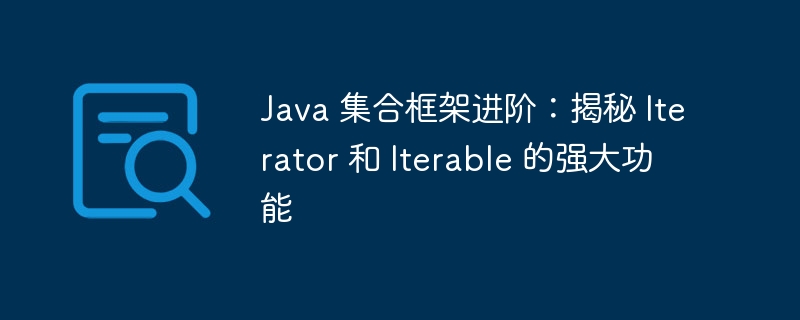Home >Java >javaTutorial >Advanced Java Collection Framework: Revealing the Powerful Functions of Iterator and Iterable
Advanced Java Collection Framework: Revealing the Powerful Functions of Iterator and Iterable
- 王林forward
- 2024-02-19 12:20:29755browse

php editor Zimo has carefully prepared an advanced topic article about the Java collection framework for everyone, which will reveal the powerful functions of Iterator and Iterable. By having an in-depth understanding of the usage and characteristics of these two interfaces, readers will be able to better master the advanced application skills of the Java collection framework and improve their programming level. Let’s explore these powerful features together and add new skills and experience to your programming journey!
Iterator interface
The Iterator interface provides methods for traversing elements in the collection, including the hasNext() method, which is used to check whether there is a next element in the collection; the next() method, which is used to obtain the next element in the collection; remove( ) method, used to remove the current element from the collection.
// 使用 Iterator 遍历 ArrayList
List<String> names = new ArrayList<>();
names.add("John");
names.add("Mary");
names.add("Bob");
// 获取 Iterator 对象
Iterator<String> iterator = names.iterator();
// 遍历集合
while (iterator.hasNext()) {
String name = iterator.next();
System.out.println(name);
}
Iterable interface
The Iterable interface defines a collection object that can be iterated. It provides a method for obtaining an Iterator object, called the iterator() method.
// 使用 Iterable 遍历 HashSet
Set<String> colors = new HashSet<>();
colors.add("Red");
colors.add("Green");
colors.add("Blue");
// 获取 Iterable 对象
Iterable<String> iterable = colors;
// 使用 for-each 循环遍历集合
for (String color : iterable) {
System.out.println(color);
}
The difference between Iterator and Iterable
Iterator and Iterable are two different interfaces. Although they can both be used to traverse collections, there are some differences between them. The Iterator interface defines methods for traversing the elements in a collection, while the Iterable interface defines collection objects that can be iterated over. Iterator objects can be used to traverse elements in a collection, but Iterable objects cannot be used directly to traverse elements in a collection. You need to first call its iterator() method to obtain an Iterator object.
Summarize
Iterator and Iterable interfaces are two very important interfaces in the Java collection framework. They provide powerful data traversal and processing functions. By using these two interfaces, you can easily traverse the elements in the collection and perform operations such as modifying and deleting elements. Mastering the usage of these two interfaces can greatly improve development efficiency.
The above is the detailed content of Advanced Java Collection Framework: Revealing the Powerful Functions of Iterator and Iterable. For more information, please follow other related articles on the PHP Chinese website!

